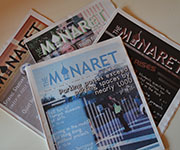False claims spread incredibly fast online: faster and to more people than accurate information does. Although the internet and social media are flooded with misinformation, there are ways that you can slow the spread and a number of sites that you should go to for updated, reliable information in the midst of the pandemic.
MorE Journalism from students at the University of Tampa
-

The Minaret
The Minaret, established in 1933, is the University of Tampa's student-run newspaper covering sports, top news stories, and arts and entertainment on campus and off. The paper also runs opinion pieces and publishes multimedia stories from time to time online.
-

UTTV Spartan News
UTTV is the University of Tampa’s student-run television station. Students reporting with UTTV utilize social media and smart phone production kits to produce, report, and share UT news. Stories are published on UTTV's YouTube channel and Instagram page.
-

WUTT Spartan Radio
The student run radio station for the University of Tampa is WUTT, which also runs with students enrolled in the COM 250 course. WUTT streams live radio shows by UT students on 1080AM out of UT’s North Walker Hall: a small academic building filled with classrooms and the Academic Success Center.





